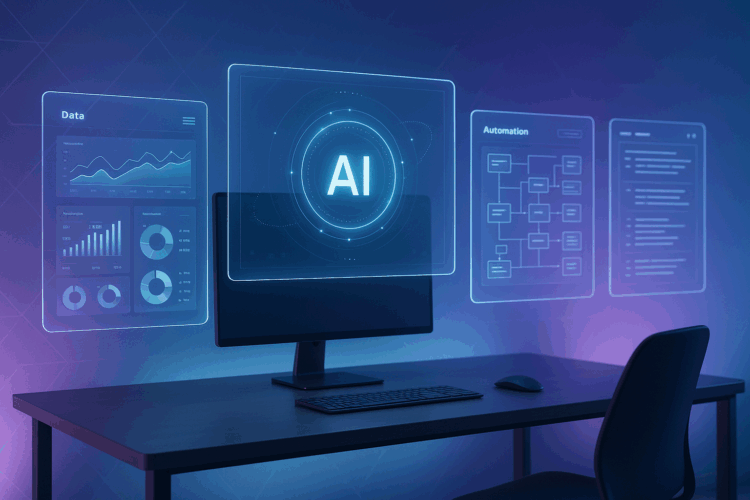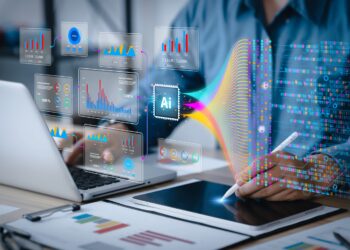Artificial Intelligence (AI) is now not a theory but a transformative power that is reshaping businesses globally. In 2025, businesses that tap into the power of AI are not only catching up with others but rewriting the very fabric of innovation, productivity, and customer satisfaction.
With AI driving all aspects of product development to decision-making, here’s how this revolutionary tech is changing businesses—and what it means for the future of success, strategy, and growth.
1. Better Decision-Making Using Predictive Analytics
To begin with, AI’s predictive analytics is empowering businesses to make smarter, faster decisions. By analyzing vast amounts of data, AI can predict customer behavior, market trends, and potential risks, allowing companies to act with confidence.
For instance, retailers now use AI to forecast demand, optimize inventory levels, and prevent costly stockouts, ultimately improving supply chain efficiency.
2. Revolutionizing Customer Experience with Personalization
In addition to improved decision-making, AI is transforming customer experiences with highly personalized interactions. Whether through chatbots, product recommendations, or personalized email marketing, AI enables businesses to engage their customers at the right time, with the right message.
Think of services such as Netflix, which uses AI to suggest content based on user interests, or online retail sites that suggest products based on your browsing history.
By providing these personalized experiences, businesses can dramatically enhance customer loyalty and conversion rates, satisfaction, and sales.
3. Automating Repetitive Tasks for Greater Efficiency
Additionally, AI is revolutionizing operations by automating routine, repetitive tasks. Whether it’s customer service or invoice processing, AI takes on these tasks with precision, allowing employees to focus on higher-value tasks, such as strategy and creativity.
In fact, a McKinsey study estimates that AI could automate up to 30% of tasks across most industries by 2030, driving productivity to new heights.
4. Streamlining Marketing and Sales Efficiency
Furthermore, AI is streamlining marketing and sales campaigns by enabling businesses to analyze customer behavior in real time. Marketing executives can now leverage AI to automate ad placements, track campaign performance, and modify their strategies to enhance Return on Investment (ROI).
In 2025, companies that are leveraging AI in marketing are already experiencing up to 50% improvement in marketing ROI compared to traditional methods.
Additionally, AI is streamlining sales processes by automating lead scoring, optimizing CRM systems, and improving follow-up strategies, which results in higher conversion rates.

5. Revolutionizing Talent Acquisition and HR
AI’s impact extends to the human resources sector as well, particularly in talent acquisition. AI-powered tools now assist HR teams in screening resumes, evaluating candidates’ behavior, and even conducting interviews, all while minimizing bias.
Through AI, HR teams can better identify high-potential candidates and more accurately predict cultural fit, ultimately streamlining the hiring process.
6. Strengthening Cybersecurity and Risk Management
As the nature of cyber threats continues to evolve, AI is assisting in bolstering cybersecurity and risk management. AI-driven systems can monitor activity in real time, identify potential threats, and even thwart cyberattacks before they escalate.
Banks, for example, utilize AI to detect fraudulent transactions in a matter of milliseconds, minimizing financial risk and protecting customer data.
7. Accelerating Product Innovation and Development
Lastly, AI is accelerating product innovation by enabling businesses to test and prototype ideas more quickly. With simulations and data analysis, companies can refine product designs and features beforehand, saving time and money.
In the automotive industry, for example, AI is being used in the creation of safer, more fuel-efficient vehicles, with organizations employing AI to simulate different designs and performance scenarios.
In short, AI is not just an innovation; it’s an essential part of business transformation in 2025. Those organizations that are integrating AI into their businesses are expanding faster, becoming more efficient, and experiencing greater customer satisfaction. AI is allowing companies to move from reaction to proaction, from guesswork to data-driven decision-making.
With AI continuing to evolve, the question now is no longer “Should we use AI?” but rather “How quickly can we deploy it in every aspect of our business?”






